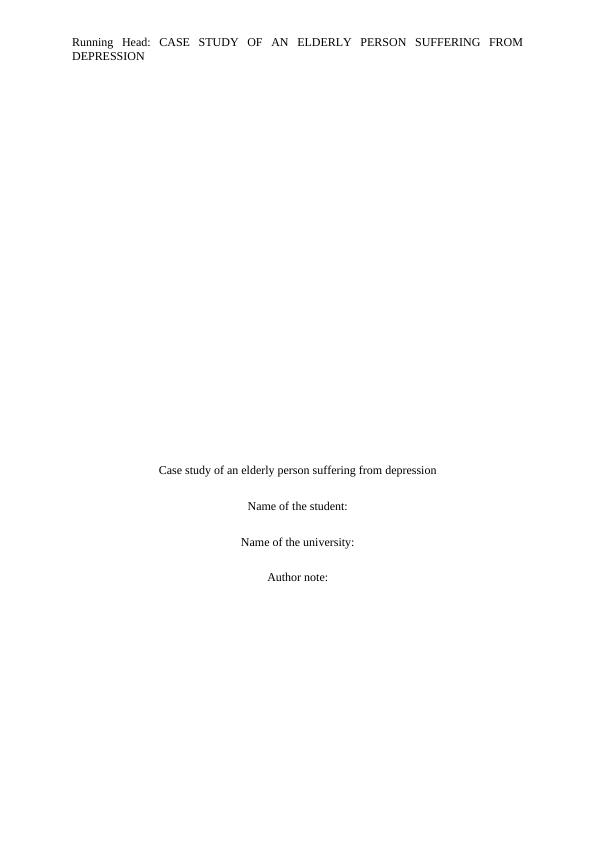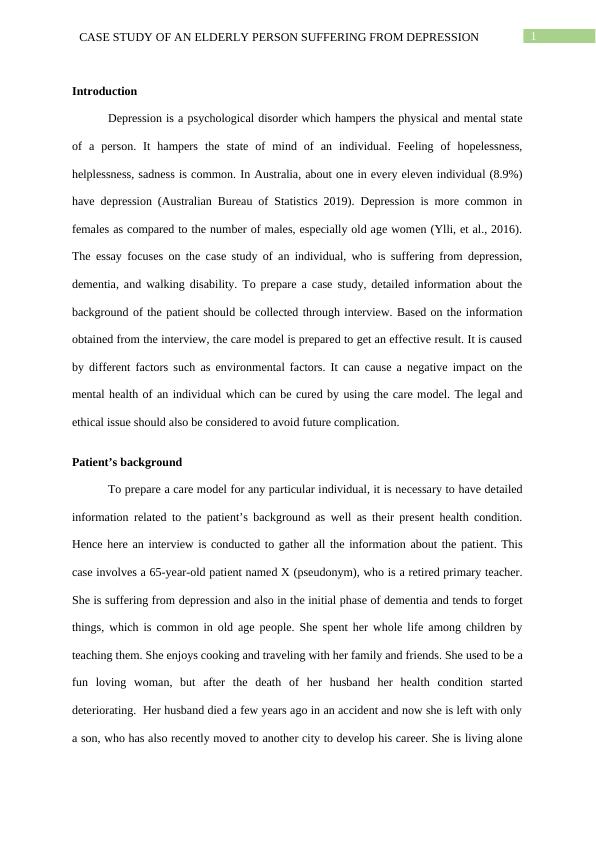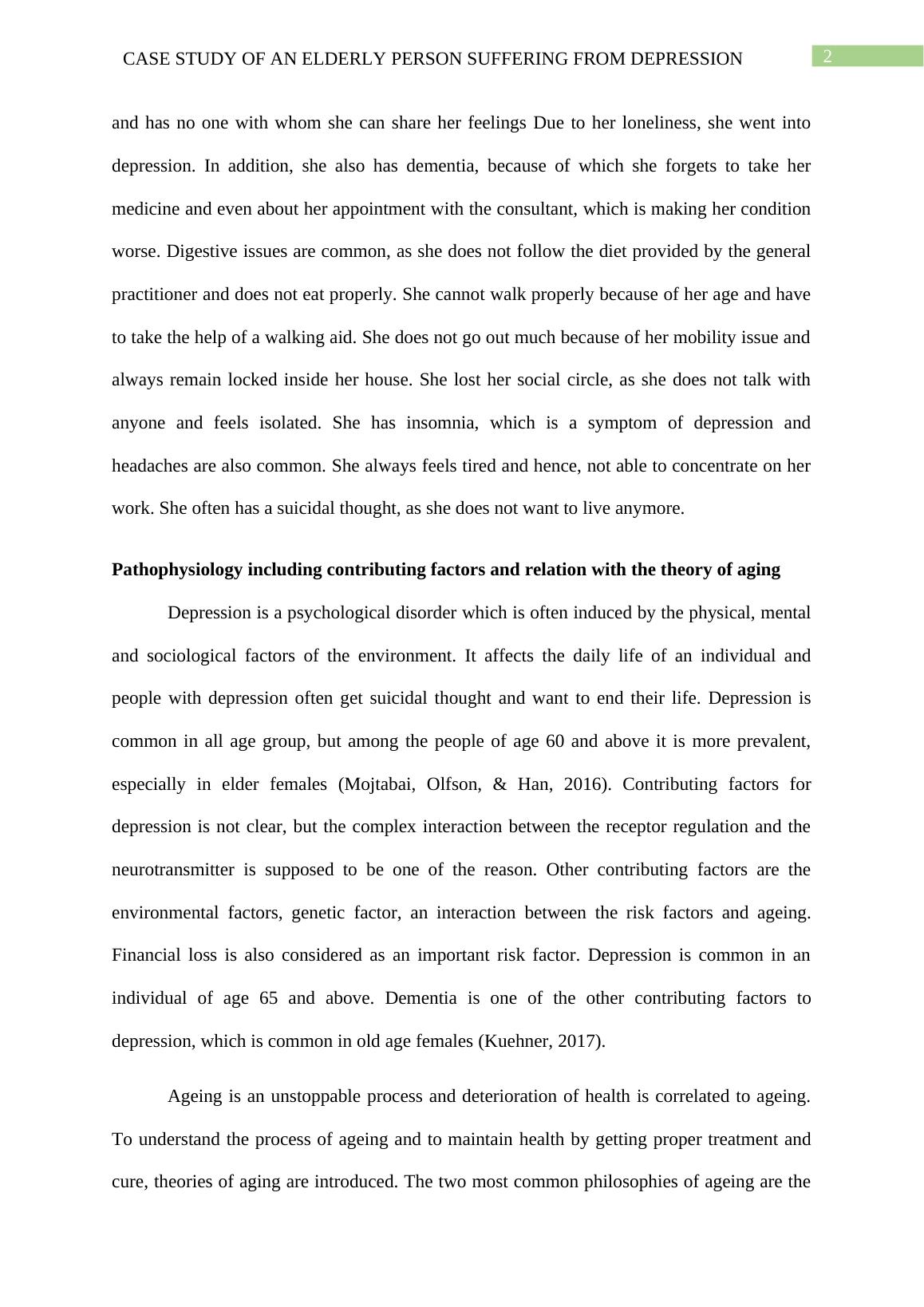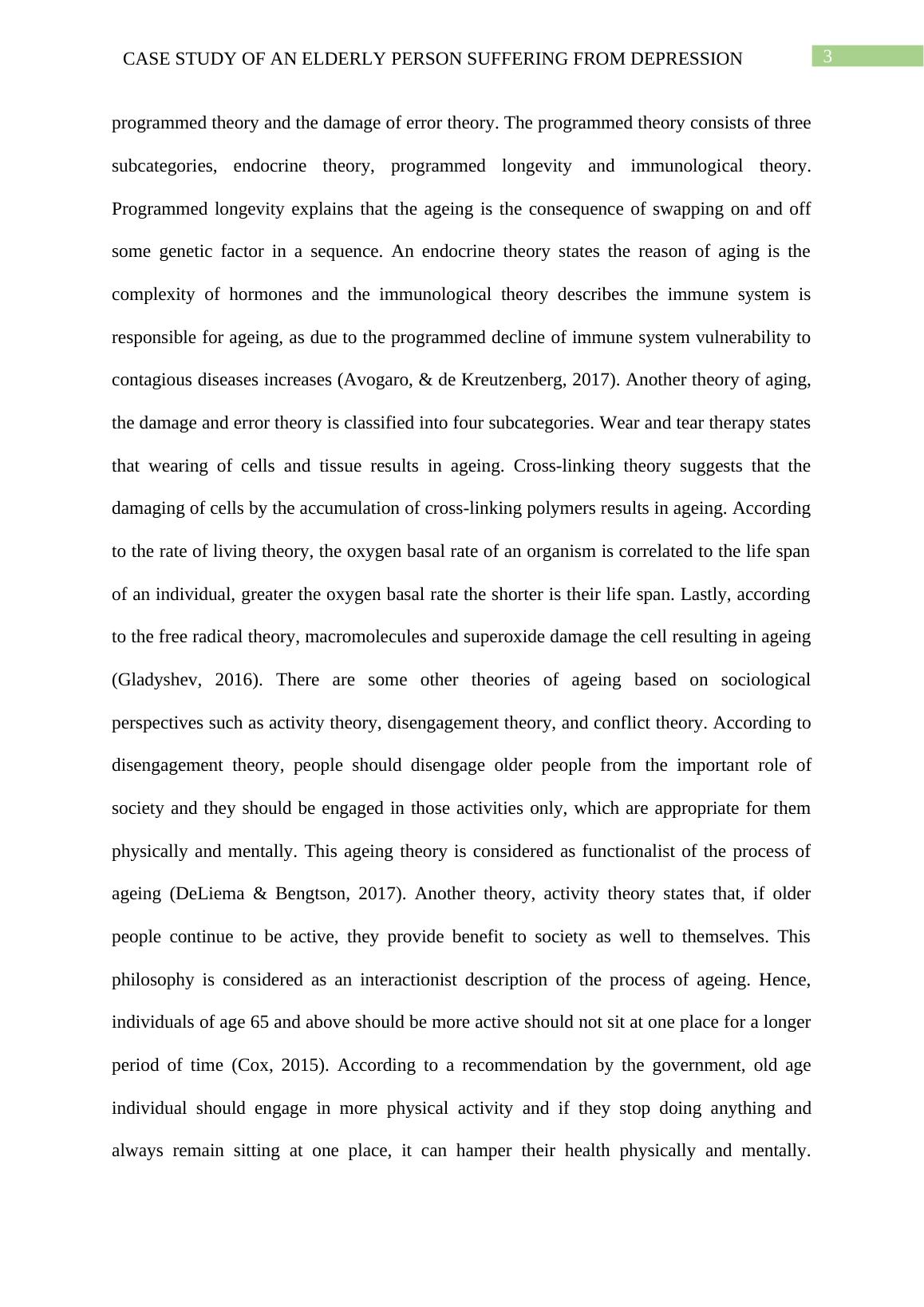Case study of an elderly person suffering from depression
Added on 2023-04-24
11 Pages3449 Words360 Views
Running Head: CASE STUDY OF AN ELDERLY PERSON SUFFERING FROM
DEPRESSION
Case study of an elderly person suffering from depression
Name of the student:
Name of the university:
Author note:
DEPRESSION
Case study of an elderly person suffering from depression
Name of the student:
Name of the university:
Author note:

1CASE STUDY OF AN ELDERLY PERSON SUFFERING FROM DEPRESSION
Introduction
Depression is a psychological disorder which hampers the physical and mental state
of a person. It hampers the state of mind of an individual. Feeling of hopelessness,
helplessness, sadness is common. In Australia, about one in every eleven individual (8.9%)
have depression (Australian Bureau of Statistics 2019). Depression is more common in
females as compared to the number of males, especially old age women (Ylli, et al., 2016).
The essay focuses on the case study of an individual, who is suffering from depression,
dementia, and walking disability. To prepare a case study, detailed information about the
background of the patient should be collected through interview. Based on the information
obtained from the interview, the care model is prepared to get an effective result. It is caused
by different factors such as environmental factors. It can cause a negative impact on the
mental health of an individual which can be cured by using the care model. The legal and
ethical issue should also be considered to avoid future complication.
Patient’s background
To prepare a care model for any particular individual, it is necessary to have detailed
information related to the patient’s background as well as their present health condition.
Hence here an interview is conducted to gather all the information about the patient. This
case involves a 65-year-old patient named X (pseudonym), who is a retired primary teacher.
She is suffering from depression and also in the initial phase of dementia and tends to forget
things, which is common in old age people. She spent her whole life among children by
teaching them. She enjoys cooking and traveling with her family and friends. She used to be a
fun loving woman, but after the death of her husband her health condition started
deteriorating. Her husband died a few years ago in an accident and now she is left with only
a son, who has also recently moved to another city to develop his career. She is living alone
Introduction
Depression is a psychological disorder which hampers the physical and mental state
of a person. It hampers the state of mind of an individual. Feeling of hopelessness,
helplessness, sadness is common. In Australia, about one in every eleven individual (8.9%)
have depression (Australian Bureau of Statistics 2019). Depression is more common in
females as compared to the number of males, especially old age women (Ylli, et al., 2016).
The essay focuses on the case study of an individual, who is suffering from depression,
dementia, and walking disability. To prepare a case study, detailed information about the
background of the patient should be collected through interview. Based on the information
obtained from the interview, the care model is prepared to get an effective result. It is caused
by different factors such as environmental factors. It can cause a negative impact on the
mental health of an individual which can be cured by using the care model. The legal and
ethical issue should also be considered to avoid future complication.
Patient’s background
To prepare a care model for any particular individual, it is necessary to have detailed
information related to the patient’s background as well as their present health condition.
Hence here an interview is conducted to gather all the information about the patient. This
case involves a 65-year-old patient named X (pseudonym), who is a retired primary teacher.
She is suffering from depression and also in the initial phase of dementia and tends to forget
things, which is common in old age people. She spent her whole life among children by
teaching them. She enjoys cooking and traveling with her family and friends. She used to be a
fun loving woman, but after the death of her husband her health condition started
deteriorating. Her husband died a few years ago in an accident and now she is left with only
a son, who has also recently moved to another city to develop his career. She is living alone

2CASE STUDY OF AN ELDERLY PERSON SUFFERING FROM DEPRESSION
and has no one with whom she can share her feelings Due to her loneliness, she went into
depression. In addition, she also has dementia, because of which she forgets to take her
medicine and even about her appointment with the consultant, which is making her condition
worse. Digestive issues are common, as she does not follow the diet provided by the general
practitioner and does not eat properly. She cannot walk properly because of her age and have
to take the help of a walking aid. She does not go out much because of her mobility issue and
always remain locked inside her house. She lost her social circle, as she does not talk with
anyone and feels isolated. She has insomnia, which is a symptom of depression and
headaches are also common. She always feels tired and hence, not able to concentrate on her
work. She often has a suicidal thought, as she does not want to live anymore.
Pathophysiology including contributing factors and relation with the theory of aging
Depression is a psychological disorder which is often induced by the physical, mental
and sociological factors of the environment. It affects the daily life of an individual and
people with depression often get suicidal thought and want to end their life. Depression is
common in all age group, but among the people of age 60 and above it is more prevalent,
especially in elder females (Mojtabai, Olfson, & Han, 2016). Contributing factors for
depression is not clear, but the complex interaction between the receptor regulation and the
neurotransmitter is supposed to be one of the reason. Other contributing factors are the
environmental factors, genetic factor, an interaction between the risk factors and ageing.
Financial loss is also considered as an important risk factor. Depression is common in an
individual of age 65 and above. Dementia is one of the other contributing factors to
depression, which is common in old age females (Kuehner, 2017).
Ageing is an unstoppable process and deterioration of health is correlated to ageing.
To understand the process of ageing and to maintain health by getting proper treatment and
cure, theories of aging are introduced. The two most common philosophies of ageing are the
and has no one with whom she can share her feelings Due to her loneliness, she went into
depression. In addition, she also has dementia, because of which she forgets to take her
medicine and even about her appointment with the consultant, which is making her condition
worse. Digestive issues are common, as she does not follow the diet provided by the general
practitioner and does not eat properly. She cannot walk properly because of her age and have
to take the help of a walking aid. She does not go out much because of her mobility issue and
always remain locked inside her house. She lost her social circle, as she does not talk with
anyone and feels isolated. She has insomnia, which is a symptom of depression and
headaches are also common. She always feels tired and hence, not able to concentrate on her
work. She often has a suicidal thought, as she does not want to live anymore.
Pathophysiology including contributing factors and relation with the theory of aging
Depression is a psychological disorder which is often induced by the physical, mental
and sociological factors of the environment. It affects the daily life of an individual and
people with depression often get suicidal thought and want to end their life. Depression is
common in all age group, but among the people of age 60 and above it is more prevalent,
especially in elder females (Mojtabai, Olfson, & Han, 2016). Contributing factors for
depression is not clear, but the complex interaction between the receptor regulation and the
neurotransmitter is supposed to be one of the reason. Other contributing factors are the
environmental factors, genetic factor, an interaction between the risk factors and ageing.
Financial loss is also considered as an important risk factor. Depression is common in an
individual of age 65 and above. Dementia is one of the other contributing factors to
depression, which is common in old age females (Kuehner, 2017).
Ageing is an unstoppable process and deterioration of health is correlated to ageing.
To understand the process of ageing and to maintain health by getting proper treatment and
cure, theories of aging are introduced. The two most common philosophies of ageing are the

3CASE STUDY OF AN ELDERLY PERSON SUFFERING FROM DEPRESSION
programmed theory and the damage of error theory. The programmed theory consists of three
subcategories, endocrine theory, programmed longevity and immunological theory.
Programmed longevity explains that the ageing is the consequence of swapping on and off
some genetic factor in a sequence. An endocrine theory states the reason of aging is the
complexity of hormones and the immunological theory describes the immune system is
responsible for ageing, as due to the programmed decline of immune system vulnerability to
contagious diseases increases (Avogaro, & de Kreutzenberg, 2017). Another theory of aging,
the damage and error theory is classified into four subcategories. Wear and tear therapy states
that wearing of cells and tissue results in ageing. Cross-linking theory suggests that the
damaging of cells by the accumulation of cross-linking polymers results in ageing. According
to the rate of living theory, the oxygen basal rate of an organism is correlated to the life span
of an individual, greater the oxygen basal rate the shorter is their life span. Lastly, according
to the free radical theory, macromolecules and superoxide damage the cell resulting in ageing
(Gladyshev, 2016). There are some other theories of ageing based on sociological
perspectives such as activity theory, disengagement theory, and conflict theory. According to
disengagement theory, people should disengage older people from the important role of
society and they should be engaged in those activities only, which are appropriate for them
physically and mentally. This ageing theory is considered as functionalist of the process of
ageing (DeLiema & Bengtson, 2017). Another theory, activity theory states that, if older
people continue to be active, they provide benefit to society as well to themselves. This
philosophy is considered as an interactionist description of the process of ageing. Hence,
individuals of age 65 and above should be more active should not sit at one place for a longer
period of time (Cox, 2015). According to a recommendation by the government, old age
individual should engage in more physical activity and if they stop doing anything and
always remain sitting at one place, it can hamper their health physically and mentally.
programmed theory and the damage of error theory. The programmed theory consists of three
subcategories, endocrine theory, programmed longevity and immunological theory.
Programmed longevity explains that the ageing is the consequence of swapping on and off
some genetic factor in a sequence. An endocrine theory states the reason of aging is the
complexity of hormones and the immunological theory describes the immune system is
responsible for ageing, as due to the programmed decline of immune system vulnerability to
contagious diseases increases (Avogaro, & de Kreutzenberg, 2017). Another theory of aging,
the damage and error theory is classified into four subcategories. Wear and tear therapy states
that wearing of cells and tissue results in ageing. Cross-linking theory suggests that the
damaging of cells by the accumulation of cross-linking polymers results in ageing. According
to the rate of living theory, the oxygen basal rate of an organism is correlated to the life span
of an individual, greater the oxygen basal rate the shorter is their life span. Lastly, according
to the free radical theory, macromolecules and superoxide damage the cell resulting in ageing
(Gladyshev, 2016). There are some other theories of ageing based on sociological
perspectives such as activity theory, disengagement theory, and conflict theory. According to
disengagement theory, people should disengage older people from the important role of
society and they should be engaged in those activities only, which are appropriate for them
physically and mentally. This ageing theory is considered as functionalist of the process of
ageing (DeLiema & Bengtson, 2017). Another theory, activity theory states that, if older
people continue to be active, they provide benefit to society as well to themselves. This
philosophy is considered as an interactionist description of the process of ageing. Hence,
individuals of age 65 and above should be more active should not sit at one place for a longer
period of time (Cox, 2015). According to a recommendation by the government, old age
individual should engage in more physical activity and if they stop doing anything and
always remain sitting at one place, it can hamper their health physically and mentally.

End of preview
Want to access all the pages? Upload your documents or become a member.
Related Documents
Assignment on Chronic Illness And Disabilitylg...
|8
|2603
|9
Reflective Writing - Interaction between Elderly Patients and Healthcare Providerslg...
|7
|1503
|138
Contemporary Issue in Health and Social Care.lg...
|17
|4784
|15
Nursing Assignment Case Study: Healthcare Settinglg...
|6
|1872
|48
Meeting the Needs of Service Users: A Case Study Using Gibbs Reflection Modellg...
|7
|1831
|444
Nursing Assignment - Dementia Carelg...
|12
|3435
|414
